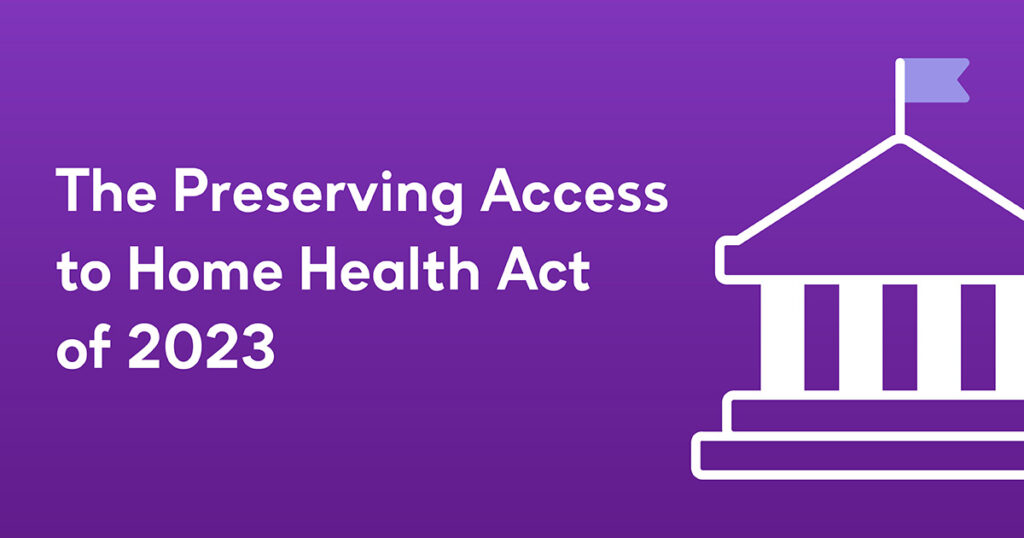As patients and families more and more often prefer their homes as the setting to receive health care, the Preserving Access to Home Health Act of 2023 aims to protect home health services for older adults and people with disabilities by preventing cuts to Medicare’s home health benefit.
The legislation arose in response to multiple rounds of cuts to Medicare home health services. In November 2023, the Centers for Medicare & Medicaid Services (CMS) finalized a permanent ‑9.36% cut to Medicare home health payments. This would reduce total Medicare home health spending by approximately $875 million in 2024, compared to 2023 spending levels. And the payment cuts continue as new proposals are released.
Many organizations are now voicing their concerns about how these cuts will affect patient access to home health care. In addition, the National Association for Home Care & Hospice (NAHC) filed a lawsuit against CMS alleging the agency used an inappropriate methodology to determine the cuts to Medicare home health payments.
Alongside these provider voices expressing concern, lawmakers are also taking action through introduction of the Preserving Access to Home Health Act of 2023.
What is the Preserving Access to Home Health Act?
Designed to protect access to home health services, the Preserving Access to Home Health Act of 2023 (S.2137/H.R. 5159) was introduced earlier this summer by U.S. Sens. Debbie Stabenow (D-MI) and Susan Collins (R-ME) in the Senate and U.S. Reps. Terri Sewell (AL-7) and Adrian Smith (NE-3) in the House.

“Home health services are a lifeline for so many […] seniors and people with disabilities, allowing patients to receive the treatment they need in the comfort of their own homes,” Sewell said in a press release. “I am very concerned about the impact that proposed cuts to Medicare’s home health program would have on these patients and their families. It is imperative that we prevent such cuts from taking effect, which is why I’m introducing the Preserving Access to Home Health Act in the House of Representatives.”
As 77% of older adults prefer to age in place according to AARP, these cuts could have a negative effect on the older population, making it harder to receive their preferred method of care.
“We commend Congresswoman Sewell for her commitment to home health and for leading this bipartisan legislation to help ensure Medicare’s invaluable home health care services are available when patients need them most,” Enhabit President and Chief Executive Officer Barbara Jacobsmeyer said in a statement. “Whether patients are recovering from surgery or managing a chronic illness or recent injury, Medicare home health is an essential part of the care continuum. We are grateful for the support from the Congresswoman and look forward to working with others in Congress to help protect Medicare’s home health benefit.”
What are the consequences of Medicare payment cuts?
Each year, inflation affects the economy, including increasing the cost of home health care. The health care industry as a whole has seen inflation grow key cost areas as 2024’s measure of inflation is at 4.5%, up from 3.8% in 2023.
When the costs of providing medical care increase and the payments to providers decrease, access to care is put at risk. That is what is on the horizon for home health providers.
Potential consequences of payment cuts to the Medicare home health program could include:
- Reduced home health care referral conversions
- Increased admissions to hospitals and emergency departments
- Impacted scope of services
- Restricted access and affected service areas
- More home health agency closures
“Home health can lower the cost of care for patients and help hospitals to safely transition patients back to home living,” Smith said in a press release. “I have serious concerns these planned cuts to Medicare would result in worse outcomes for seniors and higher costs burdens in the long run. This bill would halt the counterproductive payment cuts and increase transparency in Medicare payment policy calculations.”
The Partnership for Quality Home Healthcare (PQHH) is predicting that Medicare’s planned cuts could reach approximately $25 billion within the next 10 years.
How does the Preserving Access to Home Health Act address these concerns?
The Preserving Access to Home Health Act includes two policies related to Medicare home health payments.
First, the bill would prevent CMS from making further payment cuts to the Medicare program. Aiming to protect access to home health, this part of the act would shield traditional Medicare reimbursement from more cuts, especially during periods of inflation and increasing costs of care.
“We know that older adults increasingly want to receive health care from wherever they call home,” Enhabit’s Director of Government Affairs Tyler Shrive said. “If we continue to experience severe payment cuts, there is mounting evidence that patients will face higher and higher barriers to accessing home health services.”
Secondly, the bill would require the Medicare Payment Advisory Commission (MedPAC) to understand the economics specific to the home health care system. This includes analyzing the financial performance of home health agencies in a way that considers other payor sources beyond traditional Medicare.
MedPAC is the official group that advises Congress on issues related to the Medicare program.
Patient home health services covered by payors such as Medicaid and Medicare Advantage would be included in MedPAC’s analyses under this approach. This change would help policymakers more realistically understand home health operational and access landscapes.
“MedPAC’s existing measurements and analyses of home health agencies are too simplistic,” Shrive said. “For example, if a particular county is served by at least two home health agencies, MedPAC determines that all Medicare patients in that county have sufficient access to home health services, irrespective of geographic size or population density.
“Also, MedPAC’s access adequacy analysis uses 2021 provider enrollment and utilization data, meaning that the data that CMS relies on to assess access in 2024 is now nearly three years old and from a period before the CY 2023 or CY 2024 home health cuts occurred.”
The future of home health care
Although cuts to the Medicare program could limit access to home health care, there is hope for the future.
Legislation like the Preserving Access to Home Health Act would help stabilize reimbursement for home health services and avoid the consequences of the anticipated cuts for home health providers and the patients they care for.
Organizations such as the NAHC, PQHH and home health providers like Enhabit are partaking in advocacy efforts to raise awareness and support policy efforts like the Preserving Access to Home Health Act.
 Back to Resource library
Back to Resource library
Browse top categories
Social Share
At Enhabit our patients are our number one priority. From providing the latest medical practices to building deep personal connections, we’re focused on upholding every patient’s dignity, humanity and sense of control on their health care journey.
Home health
Our home health services give patients access to the care they deserve in the comfort of their own homes. From disease and injury management to recovery from surgery, our clinicians help patients confidently achieve their healthcare goals.
Hospice care
Our hospice care services place importance on the comfort of every patient living with a terminal illness. Our caring professionals are dedicated to providing not just physical care, but spiritual and emotional support to every patient and their loved ones.






